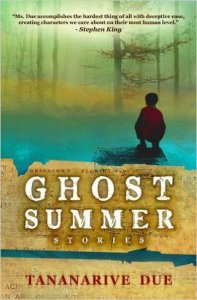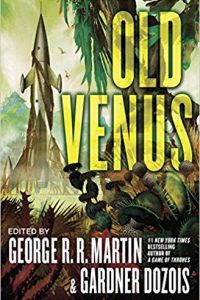Paul Di Filippo reviews Tananarive Due
Ghost Summer: Stories, by Tananarive Due (Prime Books 978-1-60701-453-9, $15.95, 336pp, trade paperback) September 2015
 This year marks the twentieth anniversary of Tananarive Due’s first book, The Between. In those two decades she has firmly established herself as an inventive, accomplished fabulist at longer lengths, as well as a creator of mainstream fictions and mysteries, some done collaboratively with her husband, Steve Barnes. (Not to mention a recent star turn hosting the Hugo Awards.) But curiously enough, given the old paradigms of apprenticeship that once dominated the field, she did not begin publishing short fiction until five years into her career, with three stories appearing at last in the year 2000. Moving at a deliberate yet hardly Robert-Reed-level pace, she has since accumulated the fifteen stories that grace her impressive first collection. The wait for such a milestone volume was well worth it, since the book holds a treasure trove of scary and touching tales.
This year marks the twentieth anniversary of Tananarive Due’s first book, The Between. In those two decades she has firmly established herself as an inventive, accomplished fabulist at longer lengths, as well as a creator of mainstream fictions and mysteries, some done collaboratively with her husband, Steve Barnes. (Not to mention a recent star turn hosting the Hugo Awards.) But curiously enough, given the old paradigms of apprenticeship that once dominated the field, she did not begin publishing short fiction until five years into her career, with three stories appearing at last in the year 2000. Moving at a deliberate yet hardly Robert-Reed-level pace, she has since accumulated the fifteen stories that grace her impressive first collection. The wait for such a milestone volume was well worth it, since the book holds a treasure trove of scary and touching tales.
The first three stories form a mini-cycle centered around the odd burg of Gracetown, Florida. It’s a deadly place worthy of a Stephen King or Robert McCammon novel, and its terrors are only enhanced by Due’s restrained language which does not favor pyrotechnics, but rather the slow, solid accumulation of bizarre and telling details and incidents, plainly stated. In “The Lake,” a teacher named Abbie LaFleur arrives in town and naively proceeds to mess with old powers that end up transforming her. But the transformation assumes an allegorical cast, as it brings out the hidden vices of her original flawed nature. Things do not end well.
Following this are two stories with similar titles, but very different tonal and atmospheric qualities. “Summer” concerns a woman named Danielle and her baby named Lola. In the manner of classic stories by Ray Bradbury and Judith Merril, the fraught parent-child relationship takes on creepy occult dimensions that dovetail with some ancient tragedies. The story features an ending whose ultimate import is highly and deliciously ambiguous.
The title story of the volume is next, and it’s pretty much a novella worthy of its weight. Our protagonist this time is Davie Stephens, a young lad whose chief delight involves visiting his Gracetown grandparents each summer, along with his father and sister. The reason for his excitement is the presence of actual ghosts. But while in years past the ghosts have been content to remain offstage, this time they get up in his face, with dangerous outcomes. Tied into this contemporary narrative is an account of events from 1909, involving three boys and the prejudices of the era. The whole tale is nicely balanced between past and present and conveys both the open-heartedness of Davie and the closed minds of his elders from both periods.
The next five stories are clustered under the rubric of “The Knowing,” which is also one of the individual titles. They are a variegated lot, exhibiting Due’s wide range, and share, perhaps, only a theme of oft-macabre mortality, both fated and unforeseen, which is most prominent in the story that lends its name to the grouping.
“Free Jim’s Mine” is a period piece. Two runaway slaves, Lottie and William, find themselves relying on the reluctant help of a Free Negro named Jim. When he hides them overnight in the dank, dark galleries of a mine, events worthy of a Mike Mignola story ensue. Like Robert Heinlein’s “Lifeline,” “The Knowing” concerns the ability to predict with certainty anyone’s death date. But Due considers the ability strictly from a personal, not societal stance, focusing on the psychological burdens thereof.
A Hard SF tale comes to us in the guise of “Like Daughter,” and concerns the practice of “copycat children” or clones. Once again, Due’s instincts drive her to hone in on the individual rather than the wider cultural dynamics of the technology, and the result is a low-key yet hard-hitting tragedy. “Aftermoon” has a fair measure of gentle humor to it, something not in great abundance with earlier stories. A female werewolf, seeing a doctor advertising that he treats “lycanthropy,” takes advantage of his services, with mixed results. Finally in this grouping comes “Trial Day,” which explores dysfunctional family dynamics—one of Due’s main themes and concerns—in depth. A young girl seeks to convince her father to support her errant brother, and the extreme supernatural measures she is willing to pursue are dramatic indeed.
The next five stories come under the heading of “Carriers,” and again one member of the set also bears that same title. They revolve around armageddon and body-horrors.
“Patient Zero” is recounted in journal format, and is the narrative of a young lad named Jay who is in isolation due to the infection he bears. The mix of dire straits and a child’s innocence is poignant. (And wouldn’t an anthology of SF/F/H stories all in journal format be a neat idea?)
Co-written with Steven Barnes, “Danger Word” is a zombie-infested tale which also manages to be an exploration of the bonds between Grandpa Joe and young Kendrick in the interstices of their fight for survival.
The next three stories form a cycle concerning a young woman named Nayima. In “Removal Order,” civilization is still partially functioning under the onslaught of the fatal “72-Hour Flu.” Nayima’s burden of an ailing grandmother is piled atop the societal ills. In “Herd Immunity,” it’s all post-collapse, and Nayima’s meeting with a fellow survivor named Kyle does not present the sunny scenario she expects. Finally, “Carriers” shows us an aged Nayima in a restored world, where her long bitterness gets some emotional solace.
Finally, the section titled “Vanishings” offers two stories. In “Señora Suerte,” an old man in a nursing home receives the benefactions of the titular goddess. And the piece that lends its name to the section concerns a disappeared husband and the family he leaves behind.
Coming to the end of this fine assortment of adventures and meditations, one can assert a couple of observations about Due’s fiction. She is not prone to high drama or blood and thunder or rollercoaster thrills. Her eye is more on small yet seismic shifts in the hearts and souls of her characters—although she will now and then offer some action-packed set pieces. Her sense of plotting is organic rather than formulaic or programmatically linear. She can inhabit first-person narratives deeply, and can also stand outside her characters in an omniscient manner. Her prose is generally low-key, but occasionally offers startling imagery. “Neecy dragged a parade of crises to my doorstep, like a cat with writhing rodents in her teeth.” “The buzzards were building new kingdoms in the city, their day come at last.” This alternation between clear-eyed reportage and more heartfelt verbiage proves effective in limning characters from the inside and outside.
In short, Tananarive Due owns the full set of sensitivities and skills incumbent on any full-fledged fantasist, and brings her unique voice to the field’s catholic conversation.






